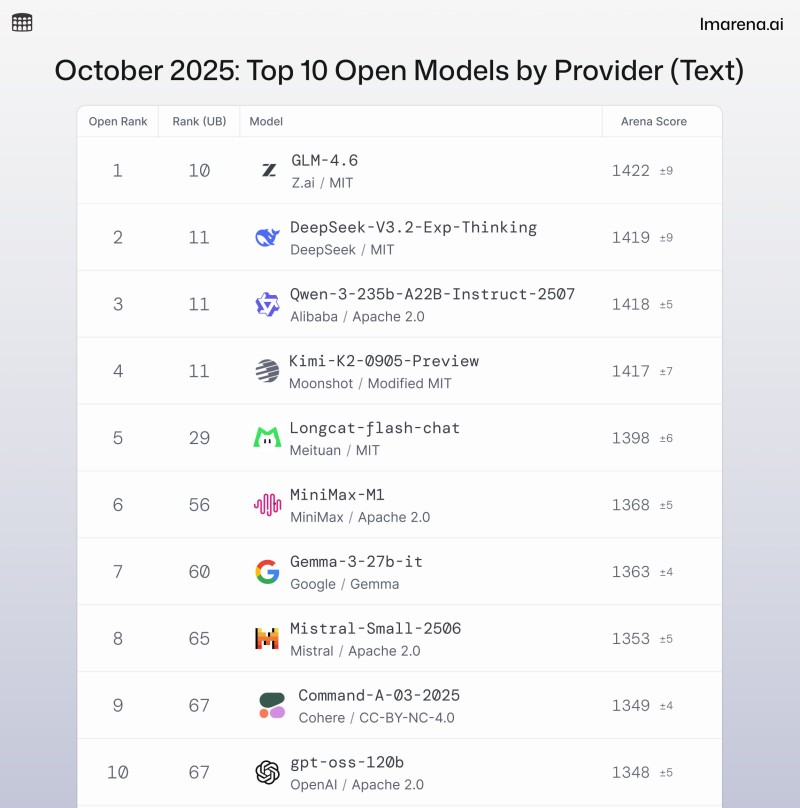The open-source AI landscape is evolving at breakneck speed, with research-driven models now matching and even surpassing many proprietary systems. In early October, lmarena.ai revealed its Top 10 Open Model Leaderboard, highlighting a competitive field where transparency and collaboration are becoming the new norm in AI development.
October Rankings Show Open Models Gaining Ground
In early October, the official account of lmarena.ai, unveiled its latest rankings. Z.ai's GLM-4.6, developed with MIT, claimed the top spot with an Arena Score of 1422 (+9). Close behind were DeepSeek-V3.2-Exp-Thinking at 1419 and Alibaba's Qwen-3-235b-A22B-Instruct at 1418.

These models operate under MIT and Apache 2.0 licenses, reflecting the growing emphasis on accessible, modifiable AI systems that any developer can deploy and improve.
The top ten includes:
- GLM-4.6 (Z.ai / MIT) - 1422
- DeepSeek-V3.2-Exp-Thinking - 1419
- Qwen-3-235b-A22B-Instruct (Alibaba) - 1418
- Kimi-K2-0905-Preview (Moonshot) - 1417
- Longcat-flash-chat (Meituan / MIT) - 1398
- MiniMax-M1 - 1368
- Gemma-3-27b-it (Google) - 1363
- Mistral-Small-2506 - 1361
- Command-A-03-2025 (Cohere) - 1357
- gpt-oss-120b (OpenAI) - 1354
Moonshot's Kimi-K2 and Meituan's Longcat-flash-chat rounded out the top five, both maintaining strong results in reasoning and conversation benchmarks. Google, Mistral, Cohere, and even OpenAI contributed models to the rankings, showing that major tech firms are increasingly embracing open evaluation frameworks alongside independent research labs.
What the Leaderboard Reveals
The lmarena.ai Arena measures model quality through human preference testing, comparing how well systems handle reasoning tasks, code generation, and natural conversation. October's results make it clear that open models are now competitive with closed systems like GPT-4 and Claude 3 across multiple performance metrics.
MIT-affiliated research models appeared frequently in the rankings, highlighting academia's crucial role in driving open AI forward. The prevalence of Apache 2.0 and MIT licenses has become a defining characteristic, giving developers worldwide the freedom to modify, retrain, and deploy sophisticated language models without restrictions.
A Shift Toward Openness
This month's leaderboard marks an important turning point in AI development. Collaboration and transparency are replacing the old model of secrecy and proprietary advantage. Models like GLM-4.6, DeepSeek-V3.2, and Qwen-3-235b demonstrate that open research can achieve cutting-edge results, encouraging even industry giants to participate in public benchmarking.
As the arena noted, new releases and updates continue pushing the frontier forward at a rapid pace. What was once a race to guard trade secrets has transformed into a competition for openness, reproducibility, and shared progress—a shift that's fundamentally changing how AI innovation happens.
 Saad Ullah
Saad Ullah

 Saad Ullah
Saad Ullah


